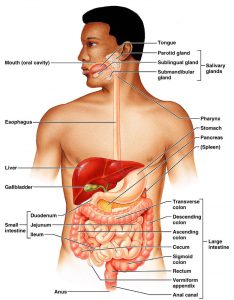
Gastroenterology is the field of medicine that diagnoses and treats conditions of the stomach, gallbladder, pancreas, liver, small intestines, colon, rectum, and the ducts between the organs.
Digestive diseases can be severely disruptive to daily life. The digestive tract is very complex and there is a wide array of symptoms that can indicate disease. Gastric symptoms should be investigated, as they are often symptoms of underlying conditions.

Conditions and Symptoms
• Barrett’s esophagus
• Acid reflux
• Blood in stools
• Celiac disease
• Colon cancer·
• Colon polyps
• Diarrhea
• GERD
• Hemorrhoids
• Inflammatory Bowel Disease
• Irritable Bowel Syndrome (IBS)
• Ulcers
Understanding Colonoscopy
Colonoscopy lets your doctor examine the lining of your large intestine (colon) for abnormalities by inserting a thin flexible tube, as thick as your finger, into your anus and slowly advancing it into the rectum and colon. This instrument, called a colonoscope, has its own lens and light source and it allows your doctor to view images on a video monitor.
Why is colonoscopy recommended?
Colonoscopy may be recommended as a screening test for colorectal cancer. Colorectal cancer is the third leading cause of cancer deaths in the United States. Annually, approximately 150,000 new cases of colorectal cancer are diagnosed in the United States and 50,000 people die from the disease. It has been estimated that increased awareness and screening would save at least 30,000 lives each year. Colonoscopy may also be recommended by your doctor to evaluate for symptoms such as bleeding and chronic diarrhea.
Understanding Upper Endoscopy
Upper endoscopy lets your doctor examine the lining of the upper part of your gastrointestinal tract, which includes the esophagus, stomach and duodenum (the first portion of the small intestine). Your doctor will use a thin, flexible tube called an endoscope, which has its own lens and light source, and will view the images on a video monitor.
Why is upper endoscopy done?
Upper endoscopy helps your doctor evaluate symptoms of upper abdominal pain, nausea, vomiting or difficulty swallowing. It’s the best test for finding the cause of bleeding from the upper gastrointestinal tract. It is also more accurate than X-ray films for detecting inflammation, ulcers and tumors of the esophagus, stomach and duodenum. Your doctor might use upper endoscopy to obtain a biopsy (small tissue samples). Upper endoscopy is also used to treat conditions of the upper gastrointestinal tract. Your doctor can pass instruments through the endoscope to directly treat many abnormalities – this will cause you little or no discomfort.
Colon Cancer Screening
Colon Cancer Screening Saves Lives
Approximately 150,000 new cases of colorectal cancer are diagnosed every year in the United States and nearly 50,000 people die from the disease. It has been estimated that increased awareness and screening would save at least 30,000 lives each year. Colorectal cancer is highly preventable and can be detected by testing even before there are symptoms. The American Society for Gastrointestinal Endoscopy encourages everyone over 50, or those under 50 with a family history or other risk factors, to be screened for colorectal cancer.
For Your Information
The American Society for Gastrointestinal Endoscopy encourages you to talk with your healthcare provider about colon cancer screening and encourages everyone over the age of 50 to undergo the appropriate screening. If your primary healthcare provider has recommended a colonoscopy, you can find a physician with specialized training in these GI endoscopic procedures by using the free Find a Doctor tool on ASGE’s Web site at www.screen4coloncancer.org. For more information about colon cancer screening, visit www.screen4coloncancer.org